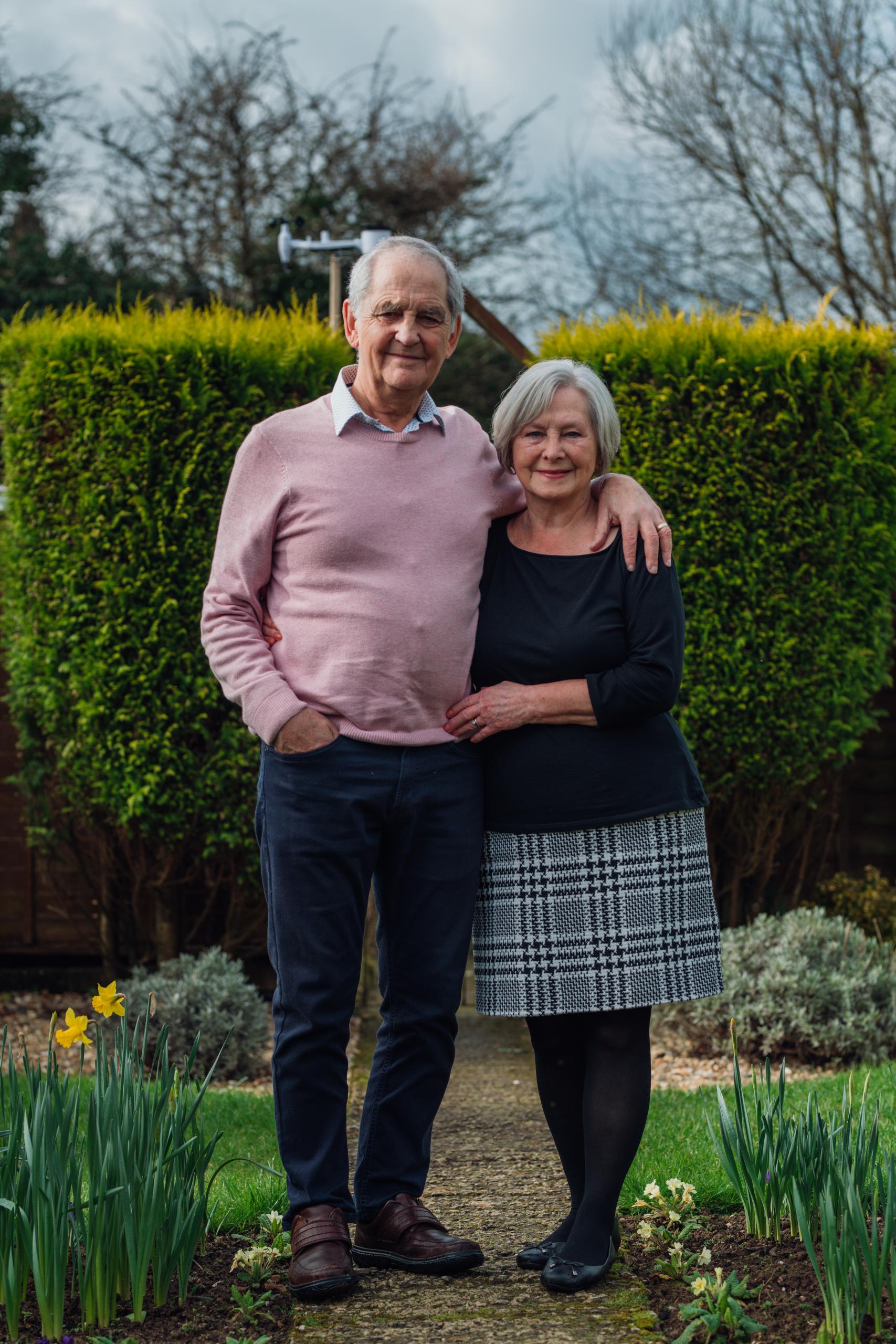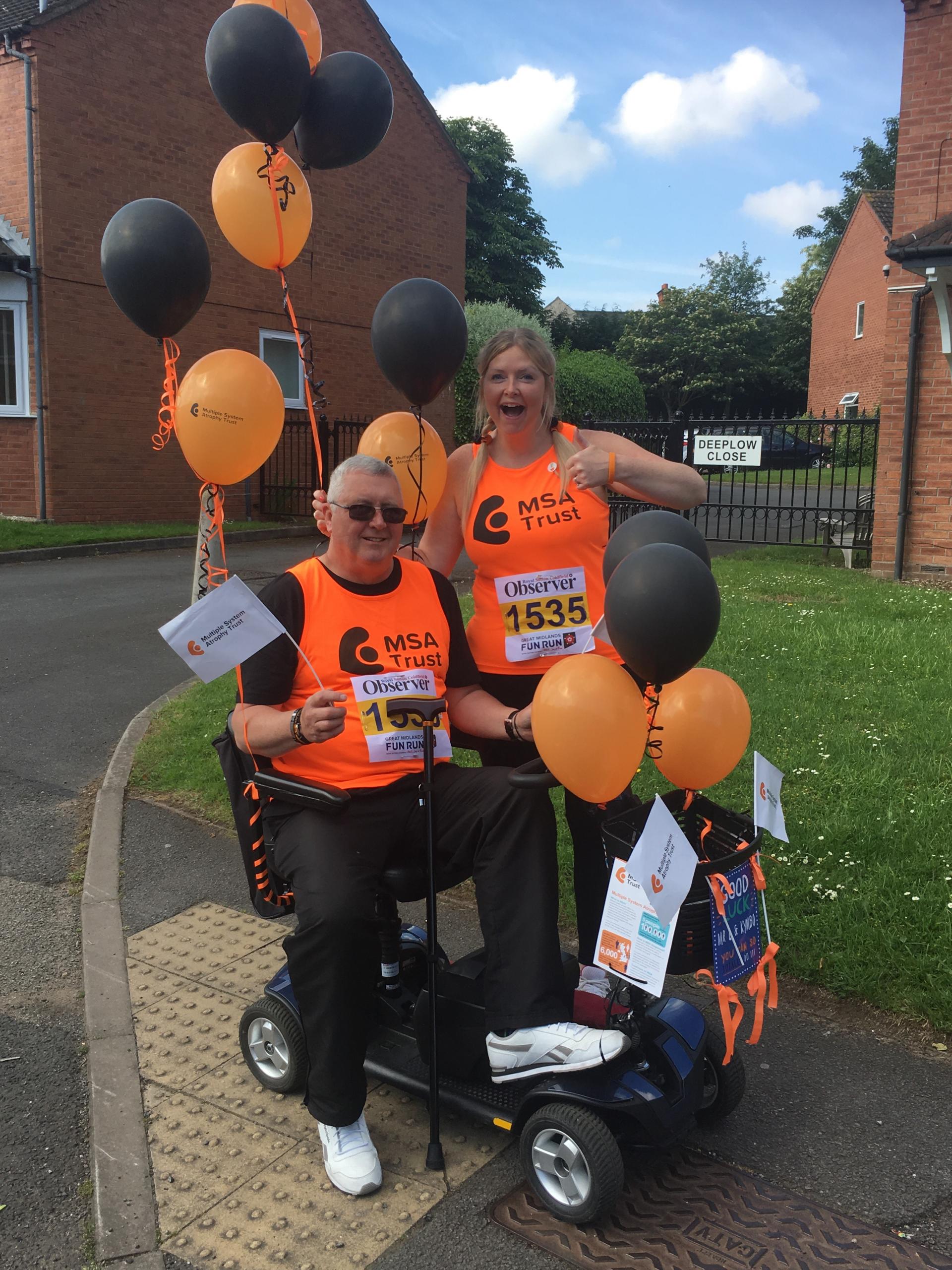Giving a voice
Chris Roper, 74, from Cornwall tells us how the Multiple System Atrophy Trust has supported him practically and emotionally since his diagnosis of MSA and helped to give him a better quality of life
Having a drink and a chat with friends is something many of us take for granted. However, for Chris Roper, 74, this comes with many challenges. “I have trouble with swallowing liquids, so I have to take very small sips, which can be quite stressful when I’m in company. It takes me so long to drink a cup of tea, in the end I don’t want to bother,” explains Chris.
“My brain also gets overwhelmed if I’m in places where there’s too much conversation going on, and I struggle to process what people are saying. My voice can fail at times, too. Sometimes, I’ll just open my mouth and quack like a duck, and the more I speak the weaker it gets.”
Chris was diagnosed with multiple system atrophy (MSA) – a rare condition of the nervous system that causes degeneration of nerve cells in the brain – in 2018. “About six years ago, in 2016, I was losing my balance a lot and developed a tremor, so I went to see a neurologist. I thought I had motor neurone disease – a condition that progressively damages the nervous system, leading to muscle weakness – and had all sorts of nerve tests but they came back OK. They then sent me to see a professor who thought I had something called Kennedy’s disease, which is a rare inherited neuromuscular disorder, but the test for that also came back negative.
“I kept going back and seeing the neurologist and other symptoms developed, including dystonia (muscle spasms) in my fingers, shoulders and toes, and regular fainting spells.”
In 2018, Chris had a DAT scan – a method of examining the brain – and was told by the doctor he thought he had MSA. “I had never heard of it, so he wrote it on a piece of paper and suggested I went home and Googled it, which I did. The information I found was quite concerning and I kept thinking, ‘Oh no, that can’t really be me’. I quickly learnt there was no cure for it, and they only try to treat your symptoms and make you as comfortable as possible, which was quite hard to take.
“I was given dopamine tablets, but all they did was make me dopey and depressed and was prescribed a medication to help with my dystonia.
I was also put on tablets to make my blood pressure go up, as MSA affects your autonomic nervous system, which regulates heart rate and blood pressure among other things, but I think the high amounts of salt they contained gave me a problem with my eyes, as I have now developed glaucoma in both eyes.
“The only other thing they said they could do was recommend me to have deep brain stimulation, which might help my tremor, but I wasn’t ready to push the boundaries any further while I’ve still got a reasonable quality of life.”
Although Chris has learnt to live with his condition, it still affects his life in many ways. “My throat isn’t quite closed properly, so if I catch a cold, it runs down the back of my throat into my lungs and gives me chest infections, and I have suffered from pneumonia.
“I’ve also got a dexterity problem and very poor coordination, so I can’t write now and dictate everything, and although I walk quite well, I wander off to the left and sometimes look as though I’m drunk. I couldn’t go for a walk without my wife, Pat, as I might wander out into the road and do tend to fall over. I also get a lot of assistance from Pat with things like getting dressed, as I can’t do buttons up or tie shoelaces.
“I also have hallucinations, and something called REM sleep disorder, where I will re-enact my dreams. I take clonazepam and a sleeping tablet to help with the sleep disorder, as I went through a stage where I would wake up with a black eye, having hit myself in the face, and my wife and I had to get twin beds in case I accidentally hurt her in my sleep. I call MSA ‘the beast’. It just goes round and round in circles and I don’t really know from one day to the next how I’m going to feel. It’s taken a while to get used to and I can still get very down and depressed.”
Not long after his diagnosis, Chris found himself going through a particularly bad patch emotionally. “I had already come across the MSA Trust during my Googling, so I spoke to them about how I was feeling, and they funded some therapy sessions for me, which was a tremendous help. I realised I was trying to fight this beast the wrong way round by attempting to get on with my life as before, which was just leaving me fatigued and unable to do anything. My therapist helped me to see this and advised me on how to adjust my day to just do the things I really wanted to do, so that’s what I do now.”
“I CALL MSA ‘THE BEAST’.IT JUST GOES ROUND AND ROUND IN CIRCLES AND I DON’T REALLY KNOW FROM ONE DAY TO THE NEXT HOW I’M GOING TO FEEL”
The charity has also helped Chris with many of the practical aspects of managing his condition. “After my first phone call, I was assigned an MSA specialist nurse, Jill, who has been absolutely fantastic. She phoned me back the day after I got in touch and talked through all my concerns, then sent some information to my GP to ensure they fully understood my condition and symptoms. Since then, whenever I go to see my NHS nurse, Jill usually attends appointments as well and they kind of compare notes.
“The charity has also given me a card I can carry to explain I’m not drunk when my walking is affected, as sometimes I can’t speak so it’s hard to explain my condition. It also put me in touch with a company that does voice banking – where my voice was recorded saying a list of words and phrases and then they made up a synthetic voice similar to my own – and kindly gave me a grant to pay for an app to use this. It’s very clever because I can preload it with phrases – such as asking for what I want in a shop or explaining my symptoms for the GP – so if my voice runs out, I can just press a button and it will speak for me.”
Chris has also benefited from the charity’s support group meetings. “There is one local to me where half a dozen people with MSA all get together every three months. It’s really helpful because you can ask about different symptoms and see if anyone else has experienced them, and they will give advice on how best to cope with what you’re going through.”
For Chris, that sense of connection and having others to turn to has been the best thing about finding the charity. “You’re never alone or out of touch with anyone, and I know I can phone Jill any time I have a question or concern, and she will help. She has such an expert knowledge of the condition, which is fantastic. “It took my wife and I a long time to get our heads around the fact that I have a disease that is going to get worse, and I might well end up in a wheelchair, but you just have to get on with it and make the most of your life and the charity has really helped with that. If I didn’t have the MSA Trust, I don’t know where I’d be now to be honest. Its support really has been invaluable.”
THE CANDIS BIG GIVE 2022:
MULTIPLE SYSTEM ATROPHY TRUST
WELFARE GRANT FUND: A YEAR-ROUND GIFT OF GIVING
TOTAL RAISED: £6,025
The money raised in the Candis Big Give will go towards growing the charity’s Welfare Grant Fund, which helps provide financial aid and peace of mind to families struggling to make ends meet due to a diagnosis of multiple system atrophy (MSA) – which is a life-limiting neurodegenerative disease.
Most people with MSA will have to give up work, which can place financial strain on families and individuals. Many people will also require communication aids or mobility equipment to help them manage the challenges of living with the condition; home adjustments, such as a stairlift or a wet room; help with travel; or quality of life services, such as respite care or counselling.
Financial pressures are a common concern for families who are coping with a long-term health condition. However, with the ongoing economic impacts of Brexit and the coronavirus pandemic, that pressure has been mounting for people who are on a restricted income. The money will go towards providing a minimum of 20 one-off payments during 2022 to people affected by MSA for whatever their need might be.
Visit msatrust.org.uk or call 0333 323 4591 for more information.
WHAT THE MULTIPLE SYSTEM ATROPHY TRUST MEANS TO ME
Karen Walker, chief executive for Multiple SystemAtrophy Trust, tells us why she loves being a part of the charity
“My friend Sarah Matheson set up the charity in 1997, four years after she was diagnosed with MSA. I remember her saying ‘This is horrendous because there’s no knowledge out there. Nobody knows anything and there’s nowhere to turn’. So, she got together with friends to help support those with the condition and raise funds for research.
After Sarah passed away in 1999, her sister asked if I would be willing to set up a support group. I agreed to do this and that was my starting point really. From there, I went on to become a trustee, then chief executive in 2015. The charity has progressed over the years to employing specialist nurses to help support people with MSA, and having many fact sheets on our website and guides we can give out to speech and language therapists, occupational therapists and other health professionals working with someone with MSA. It has also gone from offering small grants when we had a bit of extra funding to having a formally set-up welfare fund, as we realised how important that sort of support was to people. Most people will get this diagnosis in their mid-to-late fifties or sixties, and they might be trying to pull together their pensions and suddenly find themselves having to stop work. A lot end up needing financial support to help with things like wheelchairs or communication aids, mental health support, or things like taxi fares to get to medical appointments or support groups.
It is incredibly rewarding knowing we are making a real difference to people’s lives and offering such specialised support. ”





Leave a Reply
Please login or register to leave a comment.